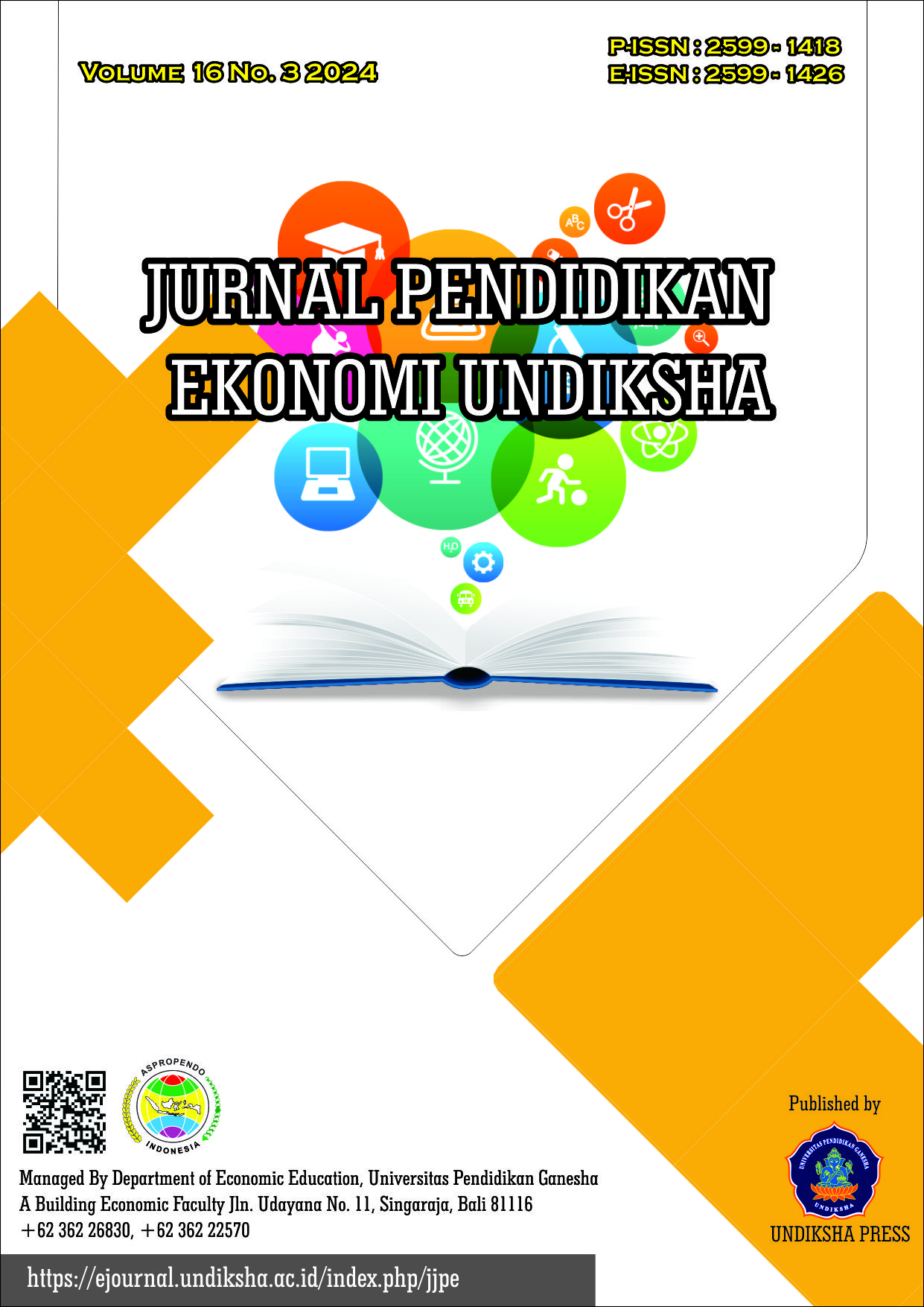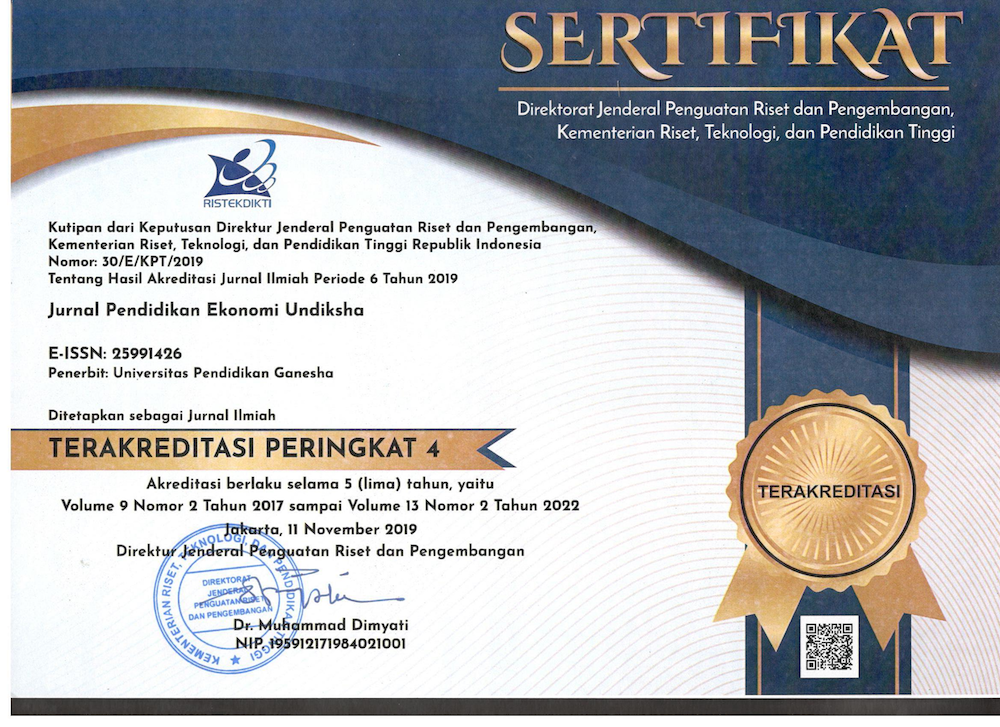Systematic Literatur Review Perkembangan Pembelajaran Gamifikasi dalam Pembelajaran Ekonomi
DOI:
https://doi.org/10.23887/jjpe.v16i3.80666Kata Kunci:
Gamification Learning, Education, EconomyAbstrak
Gamification has emerged as an approach that can increase student engagement and motivation in economics learning. The aim of this research is to conduct a systematic review of existing literature regarding the development of gamification in economic learning and then obtain a distribution for 2020-2024. The data collection technique is carried out by downloading files on the Scopus database to see trends in publications with the largest number, number of documents, ranking classifications of institutions or universities, journals and documents, as well as the use of shared keywords. The method used is bibliometric analysis. A total of 32 documents were collected through the Scopus database and then combined into one file in ris format and entered into the VOSviewer application to obtain network visualization and overlay visualization. The research results show that the trend of publications related to gamification learning in economics learning has increased from year to year. The largest number of documents is in "Springer Proceedings in Business and Economics" with four documents. A publication with the title "The effects of a gamified project based on historical thinking on the academic performance of primary school children" written by Martinez et al. (2021) with a total of 14 citations. Student is the most widely used gamification keyword along with 5 cooccurrences. Based on the keywords visualized, there are several keywords that are trending. Research focuses on gamification learning in economic learning, namely students, e-learning, economic disciplines, higher education, education, experiential learning, online learning, flipped classroom, innovation.
Referensi
A. Aminuddin, A.S. Harahap, dan M.N. Dawi. (2021). Sistem Finansial Pendidikan di Indonesia (Analisis Tentang Signifikansinya Terhadap Pengelolaan Human Capital). Hikmah, 18(2), 119-130. doi: https://doi.org/10.53802/hikmah.v18i2.125
Amany, D., dan Desire, A. (2020). Pembelajaran Interaktif berbasis Gamifikasi guna Mendukung Program WFH pada saat Pandemic Covid-19. ADI Bisnis Digital Interdisiplin Jurnal, 1(1), 48-55. doi:https://doi.org/10.34306/abdi.v1i1.116
Anggraeni, I., Firmansyah, F. H., Ramadhina, R. A. ., & Faza, N. N. (2022). Urgensi kecakapan pembelajaran abad 21 model inkuiri pada siswa SMK kompetensi keahlian multimedia. Jurnal Taman Vokasi, 10(1), 81-89. doi:https://doi.org/10.30738/jtvok.v10i1.11669
Aryantie, M. H., Hidayatm M. Y., Ratnaningsih, D., Nasution, E. L. (2020). Analisis Scientometrics Penelitian Merkuri pada Penambangan Emas Skala Kecil di Indonesia Tahun 2009-2019. Jurnal Ilmu Lingkungan, 18(1), 185-192. doi:https://doi.org/10.14710/jil.18.1.185-192
Donath, L., Mircea, G., dan Rozman, T. (2020). E-Learning Platforms as Leverage for Education for Sustainable Development. European Journal of Sustainable Development, 9(2), 1-19. doi:10.14207/ejsd.2020.v9n2p1
Donthu, N., Kumar, S., Mukherjee, D., Pandey, N., dan Lim, W. M. (2021). How to conduct a bibliometric analysis: An overview and guidelines. Journal of Business Research, 133, 285-296. doi:https://doi.org/10.1016/j.jbusres.2021.04.070
Hidayat, W.N., Fitranti, A., Firdaus, A. F., Kartikasari, C.D.I., Sutikno, T. A. (2019). Aplikasi mobile berbasis gamifikasi sebagai inovasi media pembelajaran untuk pembelajaran pemrograman dasar. Seri Konferensi IOP: Ilmu dan Teknik Material, 732. doi:10.1088/1757-899X/732/1/012113
Jayawardena, N. S. (2021). The e-learning persuasion through gamification: an elaboration likelihood model perspective. Young Consumers, 22(3), 480-502. doi:10.1108/YC-08-2020-1201
Kac erauskas, T., Sedereviciute-Paciauskiene, Z., dan Sliogeriene, J. (2022). Gamification in socio-cultural structures: advantages and disadvatages. Transformations in Business & Economics, 21(2), 181. Retrieved from
https://openurl.ebsco.com/EPDB%3Agcd%3A3%3A12262035/detailv2?sid=ebsco%3Aplink%3
Ascholar&id=ebsco%3Agcd%3A157061087&crl=f
Mansyur, M., Rofiqi, Iksan. (2023). Melangkah Menuju Kesehatan Mental Yang Optimal: Program Inovatif Di Lembaga Pendidikan Islam. Edu Consilium : Jurnal Bimbingan dan Konseling Pendidikan Islam, 4(2), 76-99. doi:https://doi.org/10.19105/ec.v4i2.9237
Marisa, F., Akhriza, T. M., Maukar, A. L., Wardhani, A. R., Iriananda, S. W., Andarwati, M. (2020). Gamifikasi (Gamification) Konsep dan Penerapan. JOINTECS: Journal of Information Technology and Computer Science, 5(3), 219-228. doi:https://doi.org/10.31328/jointecs.v5i3.1490
Martí nez-Hita, M., Carrasco, C. J. G., dan Martí nez,P. M. (2021). The effects of a gamified project based on historical thinking on the academic performance of primary school children. Humanities and Social Sciences Communications, 8(122), 1-11. doi:https://doi.org/10.1057/s41599-021-00796-9
Murdianto, D., Nurdin, M. F., Santoso, D., Silalahi, P. R. L. (2023). Rancang Bangun Alat Penyaring Susu Kedelai Menggunakan Motor Listrik. Jurnal SIMETRIS, 14(1), 1-7. doi: https://doi.org/10.24176/simet.v14i1.9344
Nashrulloh, M. R., Yanti, Y., Riyandi, F. A.-F., Nurodin, A. M., Alinurdin, R., Jipar, M. A., Faris, S. A., Dzulkhomzah, M. R., Kifti, J., Masripah, U., Alawiyah, D., Muttaqin, I. N., Mubarok, M. I. H., Maulana, M. A. A., Akib, Y. A., Sidik, G. M. (2023). Seminar Literasi Digital Bertema : Meningkatkan Ekonomi dan Menjaga Budaya di Era Digital. Jurnal PkM MIFTEK, 4(1), 54-59. doi:https://doi.org/10.33364/miftek/v.4-
1326
R. Oktaviyanthi, E. Safaah, R. A. Noviana. (2017). Pemberdayaan Keterampilan Guru Matematika dalam Menyusun Bahan Ajar Berbantuan Mathematics Education Software. Wikrama Parahita : Jurnal Pengabdian Masyarakat, 1(1), 19-24. doi:https://doi.org/10.30656/jpmwp.v1i1.270
Rahman, H. (2023). Analisis Bibliometrik: Upaya Pemberdayaan Masyarakat di Indonesia. Jurnal Pemerintahan dan Kebijakan (JPK), 4(2), 107-121. doi:https://doi.org/10.18196/jpk.v4i2.18211
Rohmanto, F., dan Susanti, A. (2021). Pengaruh Literasi Keuangan, Lifestyle Hedonis, dan Sikap Keuangan Pribadi terhadap Perilaku Keuangan Mahasiswa. ECOBISMA (Jurnal Ekonomi, Bisnis dan Manajemen), 8(1), 40-48. doi:https://doi.org/10.36987/ecobi.v8i1.2057
Sari, W. P., Salmiah, Ernita, M., Rohani, Risqa, I. (2022). Pelatihan E-Module Materi EkonomiMenggunakanFlip Pdf Profesionaluntuk Kemandirian Belajar Ekonomi dalam Pembelajaran Daring Selama Pandemi Covid-19. Tasnim Journal for Community Service, 3(2), 42-47. Retrieved from https://ejournal.anotero.org/index.php/tasnim
Unduhan
Diterbitkan
Cara Mengutip
Terbitan
Bagian
Lisensi
Hak Cipta (c) 2024 Jurnal Pendidikan Ekonomi Undiksha

Artikel ini berlisensiCreative Commons Attribution-ShareAlike 4.0 International License.





